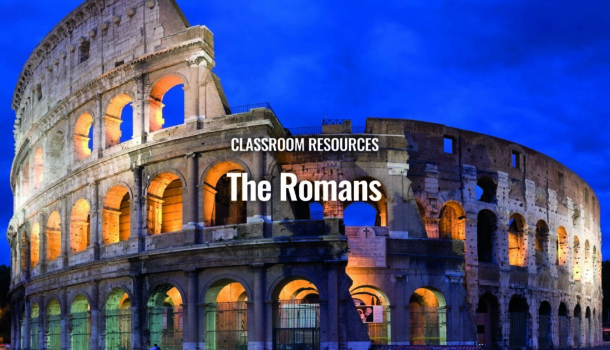The Romans
An estimated 1,800 years ago Rome, in Italy, was the centre of a huge and successful empire. Roman soldiers had conquered large parts of Europe and North Africa, making the Roman Empire very rich and powerful.
£25+ VAT
Purchase this teaching resource
- up to 300 users
- up to 300 users
- up to 300 users
Teachers’ notes
During Key Stage 2, children have the chance to investigate Roman Britain. Any study of the Romans, and in particular Roman Britain, will delight your pupils and there is enormous scope for this topic to be integrated into other subjects. This spread offers a few notes to help with your own (and the pupils) background understanding of the Romans. Whilst, there is not enough room to go into real detail, we have tried to touch on a few of the more important areas.
Roman settlements
The Romans settled and built towns all over the world (including Britain) as centres to administer the people they had conquered. Roman towns were very organised, with straight streets and rows of buildings. Wealthy people lived in large houses made from stone or brick called villas. In Britain, the Romans found it so cold that they invented a type of central heating called a hypocaust.
The Roman army
The Roman army was a skilled, brutal and effective fighting machine. The Roman Empire grew strong because it had such a strong army to help conquer and control all the territories of its empire. Roman soldiers would join the army for 25 years and were paid a good salary. A soldier belonged to a legion, which had between five and six thousand men. Each legion was divided into companies of 80 men called centuries. A centurion was the man in charge of a century.
Army camps
To maintain order and control in their colonies, the Roman Army would build camps. This was certainly the case in Britain, where the Romans built hundreds of camps all over the country. Each camp would be rectangular in shape and protected by a ditch and a wall.
Invasion of Britain
By 43 AD, the Romans (under Emperor Claudius) were ready to conquer Britain. The Romans crossed the English Channel from Boulogne in France (a country they had already conquered) and set up a base at Richborough in Kent. Different legions of Roman soldiers were sent to conquer different parts of southern Britain. Eleven British Kings surrendered to Emperor Claudius immediately and by AD 47 half of Britain had been conquered.
Boudicca
However some Kings in Britain resisted the Romans. In 60 AD, King Prastagus of the Iceni tribe, who had signed a peace treaty with the Romans, died. His wife, Boudicca, became Queen and intended to remain at peace with the Romans. However, the Romans said that all Prastagus’s land and possessions now belonged to them. They attacked the Iceni tribe, took their land and Prastagus’s two daughters. Boudicca decided to take her revenge on the Romans for this. She joined forces with Trinovantes and together they raised an army to fight the Romans. Boudicca’s army captured and burned London, Colchester and St Albans. The Romans were forced to raise the largest army they had ever had to defeat Queen Boudicca. Eventually it became clear that Boudicca could not win and she poisoned herself.
Gods and religion
Before the Romans came to Britain the Celts had lots of different religions. The Romans brought a standard state religion with them, based on the belief that the Emperor would become a God when he died. The Romans believed in many Gods. The table below lists some of the more well known Roman Gods and Goddesses.

Hadrian’s Wall
One of the most famous things that the Romans built was the frontier between England and Scotland, called Hadrian’s Wall, named after the Emperor who ordered it to be built. Building of the wall began in 120 AD and the wall took nine years to complete. It was built to protect Roman Britain from the tribes that lived in Scotland called the Picts and the Scots.
Fall of the Roman Empire
The Roman Empire crumbled and fell gradually. By the year 369 AD, the Empire was running out of money and there was not enough money to pay for the army. Native peoples that had been conquered were fighting back and the Romans just could not continue to defend their territories. Eventually the Empire fell away and conquered peoples took over their own lands once again.
What the Romans did for us
The Romans left a remarkable legacy to the world in many ways and changed the face of Britain. Below is a list of a few things that the Romans brought to Britain:
- Literature
- Language (Latin)
- Sanitation (sewage)
- Aqueducts
- Education
- Irrigation (water supply)
- The calendar
- Coins
- Cement and bricks
- Public heated baths
- Paved streets and pavements
- Roads
- Wine
- Cats
- Towns
- Glass
- Laws
Roman roads
It was important for the Roman army to be able to move soldiers and equipment around the country. To do this, the Romans built straight roads to connect forts and important towns. Many of our modern-day roads are in the same place as Roman ones.
Did you know?
1. The Romans are famous for their baths, but they were not the first people to use soap.
2. Many Romans lived in blocks of flats. The Romans called them ‘insulae’, which means islands.
3. The Emperor Claudius brought elephants to Britain to help with his fight against the Iceni tribe.
4. For about a thousand years after the Romans left nearly all books in Britain were written in Latin.
5. Romans had to get married by the age of 14. The head of the family would decide whom his children would marry.
